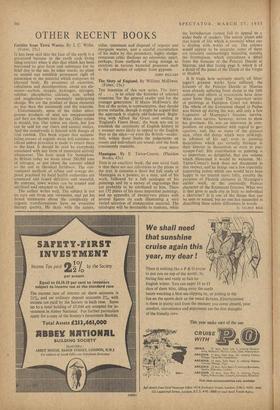OTHER RECENT BOOKS
Fertility from Town Wastes. By .T. C. Wylie. (Faber, 25s.)
IT has been said that the face of the earth is a graveyard because to the earth each living thing restores when it dies that which has been borrowed to give form and substance for its brief day in the sun. In other words, no plant or animal can establish permanent right of possession to the material which composes its physical body. By processes of excretion, exhalation and decomposition, about ten ele- ments—carbon, oxygen,, hydrogen. nitrogen. sulphur, phosphorus, calcium, iron, cobalt and magnesium—are constantly undergoing change. We are the product of those elements no less than the mammoth and the microbe.
Unfortunately, some of the richer nitro- genous products of man are unappreciated and they are thrown into the sea. Other refuse is wasted, too. Our towns are clean, but less can be said for our rivers and coastal wafers. And' the countryside is littered with dumps of foul rubbish. This book argues that accumu- lating masses of organic waste will continue to offend unless provision is made to return them to the land. It should be read by everybody associated with any form of municipal activity whatsoever. The facts speak for themselves. . In Britain today we waste about 200,000 tons of nitrogen, or just about the amount added to the soil as chemical fertilisers. The con- ventional methods of refuse and sewage dis- posal practised by local health authorities are examined and found defective and wasteful. By contrast, town wastes con be treated and sterilised and returned to the land.
The author writes well. The subject is not an easy one from any viewpoint, and yet his broad statements about the complexity of organic transformations have an evocative literary quality. He deals with the nature, value, treatment and disposal of organic and inorganic wastes, and a careful examination of his index by this pernickety, highly sludge- conscious critic discloses no omissions, apart, perhaps, from methods of using sewage as catalysts in various bacterial processes such as the extraction of sulphur from gypsum.
JOHN HILLARY


































 Previous page
Previous page